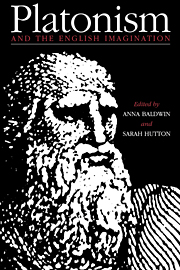Book contents
- Frontmatter
- Contents
- Notes on contributors
- Preface
- I ANTIQUITY
- II THE EARLY CHRISTIAN PERIOD AND THE MIDDLE AGES
- 2 Introduction
- 3 The Christian Platonism of St Augustine
- 4 Boethius and King Alfred
- 5 Chaucer's use of Neoplatonic traditions
- 6 Platonism in the Middle English Mystics
- III THE RENAISSANCE AND THE SEVENTEENTH CENTURY
- IV THE EIGHTEENTH CENTURY
- V THE NINETEENTH CENTURY
- VI THE TWENTIETH CENTURY
- Bibliography
- Index
6 - Platonism in the Middle English Mystics
Published online by Cambridge University Press: 15 December 2009
- Frontmatter
- Contents
- Notes on contributors
- Preface
- I ANTIQUITY
- II THE EARLY CHRISTIAN PERIOD AND THE MIDDLE AGES
- 2 Introduction
- 3 The Christian Platonism of St Augustine
- 4 Boethius and King Alfred
- 5 Chaucer's use of Neoplatonic traditions
- 6 Platonism in the Middle English Mystics
- III THE RENAISSANCE AND THE SEVENTEENTH CENTURY
- IV THE EIGHTEENTH CENTURY
- V THE NINETEENTH CENTURY
- VI THE TWENTIETH CENTURY
- Bibliography
- Index
Summary
To discuss the influence of Platonism on the Middle English Mystics is to consider something rather different from the other examples of Platonic influence in English literature discussed in this volume. Elsewhere it is usually possible to point to some Platonic text, either by Plato himself or one of his epigoni. With the Middle English mystics this is occasionally possible: various writings by St Augustine and Dionysius (or Denys) the Areopagite would have been available to the English mystics. But to concentrate on the influence of specific texts would be to misconstrue in a fundamental way the nature of the Platonic influence on medieval English mysticism. For that influence was, first of all, the influence of a tradition: a tradition of theology,concerned especially with ways of praying, that over the centuries had been decisively impregnated by Platonic ideas and ways of thinking.The history of the influence of Platonism on Christian theology goes back at least to the second century of the Christian era, if not earlier, and became so pervasive that it is almost impossible to envisage Christian theology apart from its Platonic dress.
THE CHRISTIAN PLATONIC TRADITION
The principal reason for this influence is simply that Platonism and Christianity had so much in common: that, combined with the great respect accorded to Platonism by many of their pagan contemporaries,meant that Christian theologians soon came to look to Platonism for arguments with which to defend Christianity. And there was indeed much that they held in common: belief in one transcendent God who cared for his world, belief in an afterlife in which human beings would be rewarded for the good they had done and punished for their wickedness, and a conviction that human beings were free to choose between good and evil.
- Type
- Chapter
- Information
- Platonism and the English Imagination , pp. 52 - 64Publisher: Cambridge University PressPrint publication year: 1994

